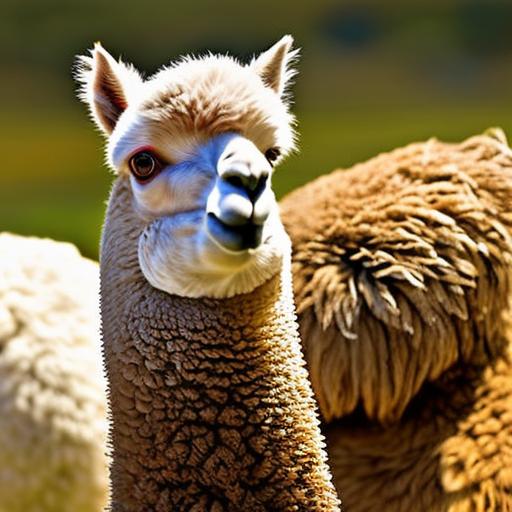Alpacas and chickens are two popular animals that are often kept together on farms and homesteads. Alpacas are domesticated South American camelids that are primarily raised for their soft and luxurious wool. They are known for their gentle nature and curious personalities. Chickens, on the other hand, are small domesticated birds that are primarily raised for their eggs and meat. They are flock animals that have a well-defined pecking order.
Many people choose to keep alpacas and chickens together because they can benefit from each other’s presence. Alpacas provide protection for the chickens against predators, while the chickens provide fertilizer for the alpacas. Additionally, both animals can be raised for their products, such as alpaca wool and chicken eggs or meat.
Key Takeaways
- Alpacas and chickens can be kept together in the same space.
- Understanding the behavior of both animals is important for successful cohabitation.
- Keeping alpacas and chickens together can provide benefits such as pest control and companionship.
- Potential challenges include differences in diet and the risk of disease transmission.
- Housing and feeding requirements should be carefully considered for both animals.
Understanding the Behavior of Alpacas and Chickens
Alpacas are herd animals, which means they prefer to live in groups rather than alone. They have a strong bond with their herd mates and rely on each other for protection and companionship. Alpacas are also known for their curiosity and gentle nature, making them relatively easy to handle and train.
Chickens, on the other hand, are flock animals that have a well-defined pecking order. This means that there is a hierarchy within the flock, with dominant chickens asserting their authority over subordinate ones. Chickens are also natural foragers, constantly scratching and pecking at the ground in search of food.
Benefits of Keeping Alpacas and Chickens Together
One of the main benefits of keeping alpacas and chickens together is that alpacas provide protection for the chickens against predators. Alpacas have a natural instinct to protect their herd, and they will often chase away or even attack potential threats to their flock, such as foxes or coyotes. This can help keep the chickens safe and reduce the risk of predation.
Another benefit is that chickens provide fertilizer for the alpacas. Chickens produce manure, which is rich in nutrients and can be used as a natural fertilizer for plants. Alpacas can benefit from this fertilizer, as it helps improve the quality of the pasture they graze on.
Both alpacas and chickens can also be raised for their products. Alpacas produce soft and luxurious wool, which can be used to make a variety of products, such as clothing, blankets, and rugs. Chickens, on the other hand, produce eggs and meat, which can be consumed or sold for profit.
Potential Challenges of Keeping Alpacas and Chickens Together
While there are many benefits to keeping alpacas and chickens together, there are also some potential challenges that need to be considered. One challenge is that alpacas can accidentally injure chickens. Alpacas are much larger than chickens and may unintentionally step on or kick them, causing injury or even death. It is important to provide separate areas for the two animals to minimize the risk of accidents.
Another challenge is that chickens can be noisy and disturb alpacas. Chickens are known for their loud cackling and crowing, which can be disruptive to the peaceful nature of alpacas. This can cause stress and anxiety in the alpacas, so it is important to consider the noise levels when deciding to keep these animals together.
Additionally, alpacas and chickens have different dietary needs. Alpacas are herbivores and primarily eat hay or grass. They also require fresh water at all times. Chickens, on the other hand, require a balanced diet of grains and protein to stay healthy. It is important to provide separate feeding areas for the two animals to prevent competition for food.
Housing Requirements for Alpacas and Chickens
When keeping alpacas and chickens together, it is important to provide separate areas for sleeping and eating. Alpacas and chickens have different housing needs, so it is best to provide them with their own designated spaces.
For alpacas, a sturdy and secure shelter is necessary to protect them from extreme weather conditions, such as rain, wind, and snow. The shelter should be well-ventilated and have enough space for all the alpacas to comfortably lie down and move around. It should also have a separate area for feeding hay and fresh water.
Chickens, on the other hand, require a coop that is secure from predators and provides enough space for all the chickens to roost and lay eggs. The coop should have nesting boxes for the chickens to lay their eggs, as well as perches for them to roost at night. It should also have a separate area for feeding grains and protein.
Both the alpaca shelter and chicken coop should be surrounded by fencing to keep predators out. This can be done with sturdy wire fencing that is buried at least a foot into the ground to prevent predators from digging under it. It is also important to regularly inspect the fencing for any signs of damage or weakness.
Feeding Requirements for Alpacas and Chickens

When it comes to feeding alpacas, their diet primarily consists of hay or grass. They should have access to fresh water at all times, as dehydration can be detrimental to their health. It is important to provide high-quality hay that is free from mold or dust, as these can cause respiratory issues in alpacas.
Chickens, on the other hand, require a balanced diet of grains and protein. They can be fed a commercial chicken feed that is specifically formulated for their nutritional needs. This feed should contain a mix of grains, such as corn, wheat, and soybean meal, as well as additional vitamins and minerals. Chickens also require access to fresh water at all times.
It is important to avoid feeding alpacas and chickens together to prevent competition for food. Alpacas have a tendency to eat quickly and may consume all the food before the chickens have a chance to eat. This can lead to malnutrition in the chickens, so it is best to provide separate feeding areas for the two animals.
Health Considerations for Alpacas and Chickens
Both alpacas and chickens require regular check-ups and vaccinations to ensure their health and well-being. It is important to work with a veterinarian who is knowledgeable about these animals and can provide the necessary care.
Alpacas should be vaccinated against common diseases, such as tetanus, rabies, and clostridial diseases. They should also be regularly dewormed to prevent parasite infestations. Additionally, alpacas should have their teeth checked regularly, as dental issues can cause pain and difficulty in eating.
Chickens should also be vaccinated against common diseases, such as Newcastle disease, infectious bronchitis, and Marek’s disease. They should be regularly dewormed to prevent parasite infestations, and their coop should be regularly cleaned to prevent the spread of disease.
Proper hygiene is important when keeping alpacas and chickens together to prevent disease transmission. It is important to regularly clean the living areas of both animals, including removing manure and soiled bedding. This helps reduce the risk of bacterial or fungal infections.
Tips for Introducing Alpacas and Chickens to Each Other
When introducing alpacas and chickens to each other, it is best to do so gradually in a neutral area. This allows both animals to become familiar with each other’s presence without feeling threatened or territorial. It is important to supervise the initial interactions between the two animals to ensure that they are getting along.
It is also important to provide separate feeding areas for alpacas and chickens. This helps prevent competition for food and reduces the risk of aggression between the two animals. Each animal should have their own designated feeding area where they can eat without being disturbed.
Best Practices for Managing Alpacas and Chickens Together
To successfully manage alpacas and chickens together, it is important to follow some best practices. Regular cleaning of the living areas is essential to maintain a clean and healthy environment for both animals. This includes removing manure and soiled bedding on a regular basis.
Providing ample space for both animals is also important. Alpacas require a large pasture to graze on, while chickens require enough space in their coop to roost and lay eggs. It is important to ensure that both animals have enough space to move around comfortably and engage in their natural behaviors.
Monitoring the behavior of both alpacas and chickens is crucial for identifying any signs of aggression or illness. Aggression between the two animals can lead to injuries, so it is important to intervene if any aggressive behavior is observed. Additionally, any signs of illness should be addressed promptly to prevent the spread of disease.
Is Keeping Alpacas and Chickens Together Right for You?
Keeping alpacas and chickens together can be a rewarding experience, but it also comes with its own set of challenges. It is important to carefully consider the benefits and challenges before deciding if it is right for you.
The benefits of keeping alpacas and chickens together include alpacas providing protection for the chickens against predators, chickens providing fertilizer for the alpacas, and both animals being raised for their products. However, there are also potential challenges, such as accidental injuries, noise disturbances, and different dietary needs.
Before making a decision, it is important to do further research and consult with experts in alpaca and chicken care. They can provide valuable insights and guidance to help you make an informed decision. Additionally, it is important to ensure that you have the necessary resources and infrastructure to properly care for both animals.
Overall, keeping alpacas and chickens together can be a rewarding and mutually beneficial experience. With proper planning, management, and care, these two animals can thrive together on your farm or homestead.
If you’re considering keeping alpacas with chickens, it’s important to ensure they have suitable living conditions. One crucial aspect is providing a large chicken coop that can accommodate both species comfortably. Poultry Wizard offers some fantastic ideas for large chicken coop designs that can be adapted to create a harmonious environment for alpacas and chickens alike. Check out their article on large chicken coop ideas for inspiration and practical tips on creating a shared space that meets the needs of both animals. For more information, visit https://poultrywizard.com/keeping-chickens/large-chicken-coop-ideas/.
FAQs
What are alpacas?
Alpacas are domesticated South American camelids that are raised for their fiber. They are similar to llamas but smaller in size.
What are chickens?
Chickens are domesticated birds that are commonly raised for their meat and eggs.
Can alpacas and chickens be kept together?
Yes, alpacas and chickens can be kept together. They can coexist peacefully as long as they have enough space and resources.
What are the benefits of keeping alpacas and chickens together?
Keeping alpacas and chickens together can provide several benefits. Alpacas can help protect chickens from predators, while chickens can help keep the alpaca’s pasture clean by eating insects and weeds.
What are the challenges of keeping alpacas and chickens together?
One of the main challenges of keeping alpacas and chickens together is ensuring that they have enough space and resources. Alpacas and chickens have different dietary needs, so it’s important to provide them with separate feeding areas. Additionally, alpacas can accidentally injure chickens if they are not careful.
What should be considered before keeping alpacas and chickens together?
Before keeping alpacas and chickens together, it’s important to consider the amount of space available, the resources needed for each animal, and the potential risks and challenges. It’s also important to ensure that the animals are compatible and that their needs are being met.
Meet Walter, the feathered-friend fanatic of Florida! Nestled in the sunshine state, Walter struts through life with his feathered companions, clucking his way to happiness. With a coop that’s fancier than a five-star hotel, he’s the Don Juan of the chicken world. When he’s not teaching his hens to do the cha-cha, you’ll find him in a heated debate with his prized rooster, Sir Clucks-a-Lot. Walter’s poultry passion is no yolk; he’s the sunny-side-up guy you never knew you needed in your flock of friends!







